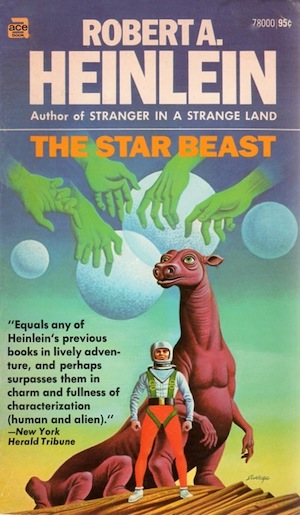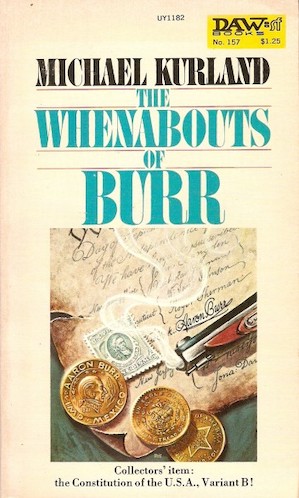Fictional bureaucrats often serve as convenient hate sinks, providing the author with characters whose occupation is generally considered fair game for scorn.1 Obstructive bureaucrats abound in fiction, perhaps because they are not infrequently encountered in real life. But not all writers settle for such easy targets. Indeed, some writers have gone so far as to make a bureaucrat or two into sympathetic figures.
Don’t believe me? Consider these five….
Mr. Kiku from The Star Beast by Robert Heinlein (1954)

Earth is a very minor world in a galaxy excessively supplied with Great Powers. It is Permanent Undersecretary for Spacial Affairs Henry Gladstone Kiku’s lamentable task to spend his days resolving endless space-related crises only for new ones to appear. He is dedicated, hard-working and professional enough not to permit his personal quirks—a terror of snakes that make the medusoid Rargyllians figures of horror to him—interfere with his duties.
Ftaelm, the very Rargyllian who makes Kiku’s phobia relevant, is but an intermediary for the Hroshii, a powerful race heretofore mercifully unknown to humans, but all too well known to Rargyllians. The Hroshii are convinced that a lost Hroshii princess has somehow found her way to Earth. They want her back. If they don’t get her back, too bad for any organisms on Earth who had plans to keep on living. It’s up to Kiku to track down the errant princess or doom his people.
***
Nathan Hale Swift from The Whenabouts of Burr by Michael Kurland (1975)

Nate Swift is a Bureau of Weights and Measures Field Observer. One might expect, therefore, that his career will consist of ensuring nobody has their thumb on any scales and that all tailors’ measuring tapes are honest. Heady stuff. Thanks to a minor Presidential quirk—that paranoid President Gosport sees his political enemies’ machinations in every crisis—Swift’s career takes an unexpected turn.
Someone has stolen the original American Constitution and replaced it with a near duplicate. The only difference is that it bears Aaron Burr’s signature instead of Hamilton’s. Gosport is determined to recover the original before rivals in his own Republican party—or worse, Democratic party foes—discover the theft and use it against him. Many Presidents would turn to the FBI at this juncture, but Gosport distrusts the FBI even more than he does the Republicans and Democrats. The solution? Assign the task to a seeming paper pusher from a bureau too obscure and boring to be on anyone’s radar and hope for the best. Which is how Swift finds himself on the trail of the stolen Constitution…
***
James Lester from Primeval, created by Adrian Hodges and Tim Haines (2007-2011)
James Lester has a clear idea of his proper role at the Anomaly Research Centre: providing effective leadership and lashings of scathing sarcasm to cowering underlings. He’s not at all a lovable boss, but although he would never admit it, he is protective of his subordinates and extremely adept at weaponizing paperwork against his enemies. Since he sees his subordinates as extensions of himself, it follows that their enemies are his as well.
The Anomaly Research Centre is charged with containing the effects of space-time anomalies linking our period to other epochs. The half-worm in Lester’s partially-eaten apple is that while Lester is bright, some of his staff are actual geniuses who are not inclined to follow the lead of a non-academic. History itself depends on teamwork, but Lester is stuck herding cats.
***
Aiah from Metropolitan by Walter Jon Williams (1995)

Aiah is a low-level functionary in Jaspeer’s Plasm Authority. Roughly speaking, she works for this world’s electric company, plasm being geomantic energy. Hardly a position to command respect, save when one considers that Aiah is a member of a despised ethnicity, the Barkazil. Convincing her coworkers to trust her with even minimal responsibility is a victory of sorts.
Fate hands Aiah a treasure in plasm. In another person’s hands, this would be the first step towards the sort of Simple Plan that ends with the protagonists as dead as a Coen Brothers’ criminal. Aiah, however, is not just hardworking and ambitious. She is cunning as well, which means not only will she leap on the chance to escape her circumstances, and not only can she find someone willing to assist her with her windfall—she has every chance of surviving the transaction.
***
Ivan Vorpatril from Captain Vorpatril’s Alliance by Lois McMaster Bujold (2012)

Ivan Vorpatril has the misfortune to be but a few convenient deaths away from Barrayar’s throne. Barrayar is a world where dynastic ambiguities are sometimes clarified with gunfire and beheadings. Ivan has been very careful to appear an unambitious, harmless fool not worth the bother of a midnight arrest and quiet execution. Ivan is, however, a capable bureaucrat, which he hopes to parlay into a long, boring career followed by a long, boring retirement.
Ivan is also a soft touch. When he discovers that Nanj, the beautiful young woman he was assigned to investigate, is being pursued by brutal thugs, he offers her refuge in his quarters. Faced with dire consequences for aiding her, he figures out an expedient solution. With the aid of a handy box of breakfast groats, he’ll marry her and envelop her in his cloak of diplomatic immunity and Barrayaran nobility.
Complications ensue. Marriage was an expedient, to be reversed by an annulment after the crisis was past. Annulment turns out to be unexpectedly difficult. Then his new in-laws soon arrive seeking refuge. His Cetagandan in-laws. Or as they are regarded on Barrayar, his war-criminal in-laws. Who, as it happens, are in search of treasure they are convinced Ivan can help them find.
***
Normally, this is where I acknowledge that everyone has their own favourite whatever I am talking about. Bureaucrats are pretty unpopular, though. Do you have favourite fictional bureaucrats? Let me know in the comments.
In the words of Wikipedia editor TexasAndroid, prolific book reviewer and perennial Darwin Award nominee James Davis Nicoll is of “questionable notability.” His work has appeared in Publishers Weekly and Romantic Times as well as on his own websites, James Nicoll Reviews and the Aurora finalist Young People Read Old SFF (where he is assisted by editor Karen Lofstrom and web person Adrienne L. Travis). He is a four-time finalist for the Best Fan Writer Hugo Award and is surprisingly flammable.
[1]The exceptions being librarians (functionaries of whom writers and readers may have fond memories) and sometimes teachers.











I love Ivan VorPatril so, so much
See also “Takeoff” (1953) by C.M. Kornbluth. Dan Holland, head of the Atomic Energy Commission, in the face of bureaucratic delays and political opposition to “official” US government development of space flight, secretly supports the private “American Society for Space Flight” by offering to provide fissionable material for its prototype Moon rocket’s propulsion system.
I’m not sure I would use the word “sympathetic,” but the protagonist of Michael Swanwick’s Stations of the Tide—known only as “the bureaucrat”—is charged with preventing the spread of dangerous technology, which is a challenging job at the best of times, and when one is up against a charismatic religious movement whose leader seems to have genuine supernatural powers, and when one has reason to believe that one’s superiors are working at cross purposes to oneself and each other, well… it’s a gripping read.
Charles Unwin from Jedediah Barry’s The Manual of Detection is a less ambiguous fellow. You might reasonably assume that his job is dull—personal clerk to Detective Travis Sivart, just one of many investigators employed by the Agency. The Agency’s cases are anything but dull; Sivart is, for instance, credited with catching The Man Who Stole November Twelfth. Unwin, however, does not get involved; he has only to organize Sivart’s notes for the files, after each case is solved. His life is predictable and he likes it that way, until the day he arrives for work and is hustled aside and told he’s been promoted. To detective.
I object to the description of the threat facing Ivan. As the most viable back up heir for much of the series, he was never at much risk of a arrest and execution. It was the opposition to the existing regime he needed to worry about. Either a conspiracy bumping him off to muddy the succession or propping him up as an puppet in the wake of a convenient air car accident taking out the Emperor.
A Memory Called Empire by Arkady Martine is full of sympathetic bureaucrats. Though having one who’s job description includes opening doors goes a long way to countering the stereotype for obstructionism. Three Seagrass is probably a little too helpful at times.
It’s been awhile since I read them so I don’t recall any specific names, but the Majipoor Chronicles are awash in bureaucrats on the Mount, in the Labyrinth, The Isle of Sleep, and the Suvrael. The entire series has a subtext of exactly how you govern such a huge, wildly diverse, and spread out planet.
Kip (Cliopher) Mdang is the lead in Victoria Goddard’s The Hand of the Emperor, and he’s a career civil servant coming to the end of a life of loyal service.
It’s a lovely book, similar in some ways to The Goblin Emperor by Katherine Addison
Given that the plot has involved talking plants, I will claim Doonesbury as SF or fantasy. At one point in the 1970s, Duke, then the American Ambassador to China, discovered that his translator Honey Huan was pretty much the last person in China able to make out what Mao was saying, which made her functionally the government. Doonesbury being a comic comic, this was played for laughs and Honey wasn’t tried next to the Gang of Four after Mao died. It’s basically the same defence Ivan uses: be amusing enough and people may overlook lapses that would otherwise end with a prison term or execution.
In Asimov’s The Dead Past, the bureaucrats doling out access to the time viewer are obstrive and annoying. Surely shining a bit of light on the situation will be seen by all as a good thing.
A little odd to see Genly AI not making the cut.
@8 And it turns out, they were only protecting human society and privacy!
Another Asimov story (don’t recall the name- Dead End maybe), has a near extinct sentient race kept in a preserve by the 1st Galactic Empire. A bureaucrat helps them escape to the LMC to start anew.
Ach!
How could I have forgotten Eddie Russett and his chair census to East Carmine in Shades of Grey: The Road to High Saffron. That book is also nothing BUT silly rules and the people who enforce them. Eddie himself is sent to East Carmine because he tried to change the rules on queuing when everyone knows he should have applied for a loophole.
Another:
Harry Turtledove’s David Fisher, a bureaucrat/agent of the “Environmental Perfection Agency,” in The Case of the Toxic Spell Dump (1993), on an alternate Earth where magic is used like technology, with its own version of toxic environmental effects. I’ve always thought it was a pity there was only one book about Fisher.
How about Keith Laumer’s Retief? Working for Corps Diplomatique Terrestrial?
Ivan’s wife’s name is Tej. He’s very much like Heinlein’s Man Who Was Too Lazy to Fail.
Isn’t everyone working at The Laundry technically a bureaucrat?
I always loved Star Beast! The tantrum the “Princess” throws to keep her “pets” is tremendously funny, and was my first (age 8 or so, and yes, I had been reading SF for a couple of years already) experience that SF could be humorous. Robert Heinlein never got credit for his ability to be deftly tongue in cheek plain old funny. He invented “flat cats” later coopted in Star Trek, and the scenes of them proliferating in The Rolling Stones still makes me laugh out loud. Yes, I have all the original old Heinleins now known as YA, and they deserve to be reissued.
@15, so is every officer in a police procedural.
—-
A surprising number of the officials of the Instrumentality of Mankind are both sympathetic and bureaucrats.
Tej is introduced as Nanj Brindis, and I dithered about which name to use before apparently making the wrong choice. But I did have a reason. It’s not just an error.
@14, 19: Got it–sticking with Nanj. Thanks for the clarification!
The largely off-stage Church functionaries in Pavane turn out to have been suppressing technology and enforcing rigid social hierarchies for The Greater Good, but I can’t say they were particularly sympathetic. Well, perhaps Brother John…
During his involuntary foray into private industry, Mr. Incredible uses his bureaucratic prowess to steer his company’s clients towards the settlements they deserve, to his boss’s tremendous ire. The bottom line depends on clients not being able to find their way through the red tape. Their error turns out to be making it possible at all, a loophole Mr. Incredible exploits.
Woolsey from Stargate. He starts out pretty antagonistic but over the course of season 5 of SGA, becomes a really compelling character!
@16: Heinlein pointed out elsewhere, in a legal kerfuffle with “The Trouble with Tribbles”, that he’d stolen the idea of “flat cats” from “Pigs Is Pigs”. I found a copy of that story on the web.
#10: Close, the story is “Blind Alley”.
Hmm. Can I just give a mention to Jorje X. McKie, saboteur extraordinary from the Bureau of Sabotage—a functionary whose job is to sabotage government agencies to stop them working too efficiently? Who appeared in the memorably bizarre Whipping Star, by Frank Herbert, along with its differently-bizarre sequel, The Dosadi Experiment?
Recommended as a tonic for those readers who associate Herbert with Dune, more Dune, and nothing but Dune.
The ever-diplomatic Bren Cameron, of CJ Cherryh’s Foreigner series.
I’ll give a shout out to Mr. Stross’ “residual human resources” of the Laundry; as an archivist at a U.S. federal agency that is often a level I feel that I’m operating at.
Dang that man Stross, beating me to Jorj X. McKie… perhaps I could put in a good word for the stalwart chaps at the Department for the Measurement of Scientific Works, better known as Doomwatch? They did a lot to fend off rogue scientists and bizarre environmental crises, and only one of them went mad and tried to destroy the world with anthrax bombs.
Ivan’s “Snakes” metaphor for problems was so useful, I started a running list of snake-based “things I really wish I could say when bug-wrangling” at my tech job, like “We are not refusing to deal with your snake. Your snake is, in fact, a garden hose; ‘nothing’ is the correct course of action.”
29: I am having a flashback to the time a client got extremely angry at me because their change room had large windows through which passersby could watch the dancers changing. This was a problem about which I could do nothing for two reasons: I was an usher that day and did not have the authority to alter room bookings. I could not even leave my post because I was where I was for a reason. Also, once I pointed them towards the people who could help, it turned out the inappropriateness of the room was because they’d commandeered a classroom outside our control without telling anyone or apparently noticing that it had large windows through which passersby could watch the dancers changing.
@21 that reminds me of a superhero genre book with a character who’s power is bureaucracy and he uses it at his job as a health insurance functionary to get claims approved. I can visualize the cover but not the title.
@19 and @20, Ivan’s future wife has the cover ID of Nanja (note final “a”) Brindis (p. 6 of paperback ed.), and her family is much more accurately described as Jacksonian (from Jackson’s Whole), not Cetagandan. The only full-blood Cetagandans are Ivan’s mother-in-law and grandmother-in-law.
Can we compromise on calling them a mix of former war criminals and future enemies of the state?
Katepreach @6 I was thinking of Kip Mdang also. I’m reading that book now and enjoying it quite a bit.
@15, @18 (among others): I have this image of a bureaucrat as someone who follows plans other people have decreed, rather than exerting initiative; ISTM Bob-in-the-Laundry, or even a typical street cop, is expected to exercise more judgment. But it’s a broad spectrum rather than a hard barrier.
Eric Frank Russell’s “Still Life” has a lot of bureaucrats being bureaucratic (to the point where some could be described as jobsworths even if they’re managers), but the two who start and end the story manage to hack the system so it actually does something useful. ISTR this is unusual for Russell, whose heroes generally ran rings around bureaucracies from the outside, but I’d love to hear counter-examples from other readers of antiquities.
How about the narrator and the ‘criminal, Benjamin Bathurst’ in Piper’s ‘He Walked Around the Horses?’
Also, Tortha Karf from the Paratime series. Verkan Vall, as a police officer, may be too active for the title of ‘bureaucrat.’
Usually there’s enough leeway in the rules and guidelines for someone to increase the degree to which they are obstructive or the degree to which they are helpful.
Ning Choi-san of A Chinese Ghost Story is a bureaucrat of sorts, tolerable in his primary job (debt collection) because he’s terrible at it. Good man to have around if you want to end dealing with seductive ghosts and angry tree demons, though not quite as useful if what you want to do is escape same.
@31 That would be Flex/The Flux/The Fix by Ferrett Steinmetz! It’s a pretty good story. The premise is that magical ability tends to rise up in folks with a particular passion or obsession with a phenomenon — the protagonist’s claim to fame was being able to cope with bureaucracy and paperwork.
Hermes Conrad from Futurama.
How about the man who positively loves being a bureaucrat, Hermes from Futurama?
@6,
And with that reminder, we have any number of bureaucrats in The Goblin Emperor.
Charles Unwin in Jedediah Berry’s “The Manual of Detection”
Linus Baker of the Department in Charge of Magical Youth in T. J. Klune’s “The House in the Cerulean Sea”
Maximillian Barker at the Department of Unnatural Registration and Processing of Shifters in G. L. Carriger’s “The Summage Solution.” (Not to mention his kelpie boss)
And let’s not forget Jones from the “Hoka” stories, a minor bureaucrat in a large diplomatic structure…
Maxim Mokhov, the kindly and inexorable bureaucrat from Francis Spufford’s Red Plenty comes to mind.
Poul Anderson had an immortal character spend a few centuries in the Roman/Byzantine bureaucracy
I’m surprised no one has mentioned T Kingfisher’s Temple of the White Rat in her Paladin series, which is basically an entire religion of good bureaucrats.
One example comes to mind, from the at times misty border between diplomats/civil service/secret service/inspectors general:
Chunderban Desai, who was a supporting character and then a protagonist in a couple of the stories in the “Imperial” elements of Poul Anderson’s “Technic” future history, in (at least) a couple of the stories/novels, and was portrayed pretty sympathetically as a civil servant working for stability in an unstable era…
@40 & 41
Hermes Conrad: Not so fast! While I was filing, I came upon a certain document filed by a certain Morgan Proctor. Form B, notification of romantic entanglement.
Fry: That’s right, she fraternized me!
Morgan Proctor: That form wasn’t about you. It refers to my high school prom date. It was a regulation date that ended in regulation disappointment.
Hermes Conrad: Yes, but you only stamped it four times.
[All gasp]
Morgan Proctor: No! No! I was young and reckless!
Mayor Wilkins of Sunnydale, in Buffy S3, one of the nicest bureaucrats you’ll ever meet. He has an enviable work ethic, largely because he’s working to become an immortal giant snake monster but then nobody’s perfect.
@21 Mr. Incredible at the insurance agency, yes, but no mention of Roz from Monsters Inc.? Somebody clearly forgot to file their paperwork.
https://www.youtube.com/watch?v=vJV7TUF9Gxw
In the form of a theological bureaucrat, Father Paityr Wylsynn in Weber’s Safehold serious. Initially responsible for making sure any technological innovations followed the restrictions the religion established and that to make sure that loopholes weren’t being exploited, once he was let in on the Big Secret regarding the true history of the planet, he kept the same job but started gleefully helping to identify and exploit any loopholes he could find or create through bending, folding, and mutilating the interpretation of the religions proscriptions.
@18: Ben Aaronovitch’s “The October Man” novella is a departure from adventures of a magic police officer in London to adventures of magic police officers in Germany, although they talk about the London guy a lot despite having never met him. They also talk about their paperwork, not really very often but with intense feeling when they do.
Can’t believe we’ve got this far with no-one mentioning The Bursar aof Unseen University (and Ponder Stibbons who took over some of his duties). There’s also Drumknot at the palace, but he gets less ‘screen’ time, and in later Watch books, the feared auditor, A.E. Pessimal.
Hrrrm. How about the main character from Michael Swanwick’s Nebula-winning novel ‘Stations of the Tide’? He’s only known as the Bureaucrat and apparently Gene Wolfe would have been the perfect casting selection. I ask you.
*grin*
I saw the title and thought, “Oh, if Mr. Kiku isn’t mentioned, I’ll be heartbroken.”
So yeah, a grin from the first mention.
My favorite SF bureaucrat has got to be Daniel D Appleby of Sam Delany’s “Babel-17,” the uptight, strait-laced Customs officer thrown into the chaos of Transport culture when he accompanies Rydra Wong on her emergency search for a compatible ship’s crew of unique characters — both living and discorporate — of every conceivable gender and sexual preference. Watching this dyed-in-the-wool conservative having to confront and rethink his assumptions, to the point where he starts to frequent Transport culture spaces and even opts for a subtle body modification he can hide under his shirt in the office, is an absolute delight. Truly, meeting real people and recognizing them as human can change minds and hearts, under the right circumstances!
I’d like to suggest Morozov from Captain Vorpatril’s Alliance as well for this category. I’ll always remember his use of the phrase “charming understatement.”
Glory Road’s bureaucrat never appears on stage but has a major effect on the plot:
obviously cecil from invincible and the guy who called in kirk to help with the klingons in the tribbles episode.
yes he shouldn’t have used the emergency channel but the klingons were in fact plotting something! he was right all along! and if there’s one thing kirk ought to respect it’s flaunting the rules to stop the bad guys.
Priscilla Hutchins in Jack McDevitt’s Academy novels starts as pilot but later on is stuck behind a desk in a bureaucratic position while others are out where the action is.
@37: I should have been more specific: a bureaucrat is someone whose job is to carry out others’ directives. The sympathetic ones are, as you note, the ones that use the laxness in the directives to get something better done.
@59: given what we learn near the end of the book (in the last conversation with Rufo) about how long the “hero” has been groomed for his role, I always figured that Scar’s getting his request involved outside manipulation rather than a bureaucrat suddenly being humane. Star needs a destination gate, rather than being able to drop in anywhere like one of the manipulators in The End of Eternity, but stamping and moving a piece of paper seems trivial after what else we find out they’ve done.
Mr. Kiku was also my first thought after reading the title! I’m actually somewhat shocked that Heinlein portrayed any government officials in a sympathetic light.
My personal favourite has to be Jame Retief.
@32 Ivan’s grand mother-in-law isn’t just Cetagandan, she’s Haut, born of the Star Creche’s core group of genetically modified humans who are the main genetic engineers of the Cetagandan Empire, and her daughter was born of a Ghem Husband (The slightly lower military caste who are also genetically modified), and herself a trained genetic engineer who manipulated the genomes of her kids.
On Barrayar, the level of genetic manipulation is scandalous enough that Ivan will happily stay outside succession. And for most of his 35 years, Ivan was effectively Crown Prince Ivan, as Aral didn’t’ want the job for him or his son. Its only around when Ivan is 31 that someone else manages to create a bit of breathing room.
Oh and only Grandma is a war criminal, (maybe).
Patty Jansen’s “Ambassador” series, I think, fits. I mean who is more of a bureaucrat than an ambassador? And he gets into (and out of) all sorts of escapades. For at least 10 books-worth.
Ursula K Le Guin expressed a great deal of sympathy for Nobusuke Tagomi, from Phillip K. Dick’s The Man in the High Castle.
Moist von Lipwig, forced into running Ankh Morpork’s Post Office
Fellirian and Morlenden Deren are the main narrative focus of ‘The Gameplayers of Zan’ and are unquestionably bureaucrats. Apart from farming their garden, their primary job in the superficially rustic and bucolic society of the not-human ler is to keep records of marriages, births and deaths, and such.
It is mostly fortuitous that the Deren braid and Morlenden in particular becomes tasked with solving the mystery of a disappearance and suspected foul play, and his insistence on doing a good thorough job of it which leads to… a lot of unexpected consequences, for everybody.
And thanks to C. Stross for the reminder of Frank Herbert’s BuSab – Bureau of Sabotage, an entire government bureaucracy aimed at sabotaging government bureaucracy and the very idea of bureaucracy.
After Mr. Kiku, the one who jumps to my mind is John Frobisher in Torchwood: Children of Earth. Although he orders multiple evil acts in the name of the bureaucracy he serves, one can’t help feel that he was an otherwise decent man who was just too weak to overcome his place in that bureaucracy. An extraordinary performance by Peter Capaldi before he took on the role of the Doctor.
Chrisjen Avasarala in “The Expanse”. And wow, I can’t believe I’m the first on that one! Perhaps overlooked because she’s so good at achieving her objectives? But UN Undersecretary is pretty much “bureaucrat” defined.
Mobius on Loki.
@42 – The Goblin Emperor and The Witness for the Dead are positive celebrations of bureaucracy done right. There’s a bit early on in the second book when Celehar stops by the Office of Cartographers for directions to his destination, and by the time that scene and the next are done, I’ve realized that the novel is a celebration not only of good bureaucracy but also of public transportation. (And maps. There are so many loving descriptions of exactly which tram line goes where along what streets!)
And may I add a shout-out to Three Seagrass? (A Memory Called Empire, A Desolation Called Peace.) She may get thrown into adventures, but her job and her role and her nature are very much super-effective bureaucrat.
FWIW, the bureaucrat in the Asimov story others have mentioned was named “Loodun Antyok.” (He was the first character I thought of when I saw this article, with Mr. Kiku occurring to me a split second later!)
Asimov wrote a non-SF story about an American mistakenly arrested in Russia. He had no identification on him to prove that he was just a tourist. The bureaucrat interviewing him—who wants to do the right thing for this idiot—finally noticed the guy’s tube of American-prescribed medicine. “Okay. You’re free to go.”
Isaac said he wrote it as a counterweight to the demonization of Russia at the time.
About the demonization of Russia. When I was in elementary school, a teacher assured is that Russians were just ordinary people. “if a Russian man walked into this room, he would look like any other man.”
Isaac never said he was rehabilitating demonized bureaucrats.
Might I add the Chief of Operations at St. Mary’s? Imagine, if you will, the expense reports. <G>
Steve Wright at #28: weirdly, I was involved in a (failed) attempt to reboot Doomwatch for BBC 2 about a decade ago! Was going to be updated to the present day. Big problem was, most of the original episode idea had already come true (except for the nuclear terrorism one, thankfully). I was on board as scientific/plot advisor. It hit the buffers when director Jeremy Dyson had another project take off.
@Katepreach, thanks for the mention of Kip Mdang in Victoria Goddard’s The Hand of the Emperor – have now read and really enjoyed it!
Came here to second @71, I love Chrisjen. I think mrs. warden from Yahtzee Croshaw’s Will Save the Galaxy for Food would also count
Retief was the first character to lea to mind.